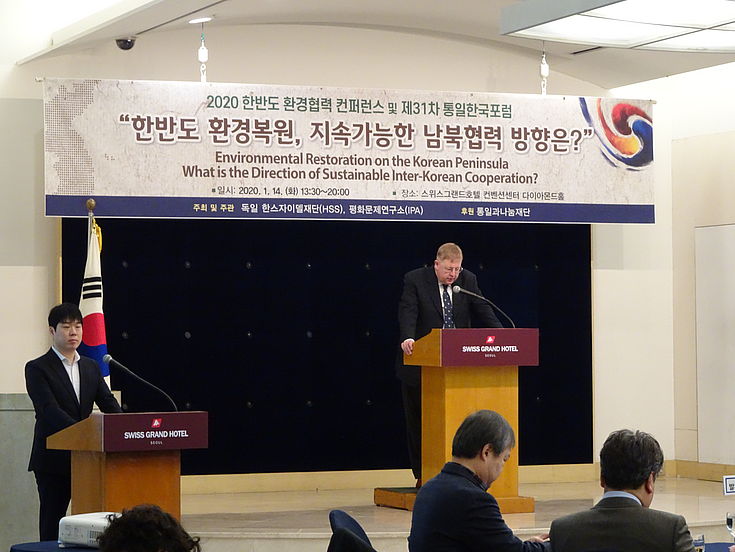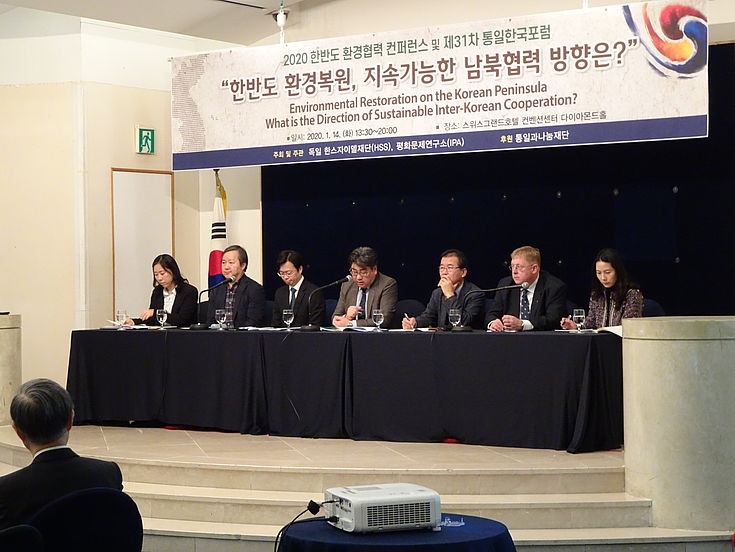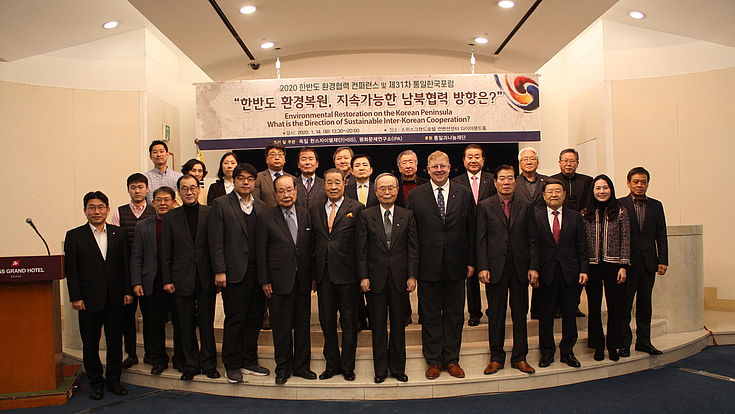Conference
Environmental Restoration on the Korean Peninsula
The conference was begun with the opening address of Dr. Bernhard Seliger, the representative of HSF Korea Office, and welcoming address by Jae-Sik Son, the president of Korean Unification Forum, and congratulatory address by Byung-Gil Jeon, an executive secretary of UniKorea Foundation. Topic presentations were consisting of speeches of Professor Woo-Gyun Lee from OJERI, Korea University, Jun-Mo Lee from Concern Worldwide Korea, and Dr. Seliger from HSF Korea Office. Lastly, as a moderator, Dr. Gwan-Ho Kim from Rural Research Institute led a designated discussion and Q&A session, and Dr. Gyung-Seok Park from Forest Management Strategic Institute, Dr. Soo-Jeong Myung from Korea Environment Institute, and Dr. Hyun-Ah Choi from HSF Korea Office has participated for this session.

In his opening speech, Dr. Seliger not only focused on the environmental restoration but also mentioned other very important issues such as disaster management, Brown environmental problems, diseases and animal pests, and afforestation. He emphasized to approach humbly and not expect a great breakthrough by one action, but rather try to achieve many small-scale implementations. In addition, he thanked the IPA and other partner organisations of HSF, as well as the UniKorea Foundation for sponsoring the conferences, and expressed the feeling of gratitude to all who presented.
Jae-sik Son, the president of Korean Unification Forum, stressed that not only war, but also environmental destruction and pollution threaten human life, and that environmental pollution in one region will causes another pollution in the neighboring countries. Therefore, environmental cooperation among countries is as important as security and economic cooperation. He said North Korea originally had magnificent forests, but they were ruined after liberation, while the South well restored the forests through numerous efforts. Byung-Gil Jeon, the executive secretary of UniKorea Foundation, also referred to the land degradation and claimed that the environmental issues are being pushed back due to political issues, even though ecosystem on the Korean Peninsula is facing various challenges. He said that the North is trying to approach the international community and pay more attention on the agenda of poverty, food and security as well. Lastly, he stated that this conference will be an event to discuss which principles should be taken to restore the environment on the Korean Peninsula.
Professor Woo-Gyun Lee from OJERI, Korea University, gave a speech on the inter-Korean cooperation associated with Sustainable Development Goals (SDG). Professor Lee claimed that the South has successfully restored forests despite its economic development, and he also explained that there is no rich country whose forests are destroyed. The North is currently on the stage of land degradation, and the ecosystem service which is needed for this stage is “water, energy and food security nexus”. The approach for the ecosystem service should be in order of “National Action Plan – Regional Detailed Plan – Site Execution Plan,” however, as this type of system has yet to be established in the North, it should proceed with inter-Korean cooperation before moving on to the level of the international organization. He further concluded that while there are many senior experts exist in the field of inter-Korean cooperation, experts of younger generation who can work with the United Nations for more than 30 years are needed.
The second topic presentation was about the inter-Korean cooperation and NGO’s actions in the field of WASH, which was handled by Joon-Mo Lee, the head of Concern Worldwide Korea. Concern Worldwide Korea is an international humanitarian agency whose mission is to derive the change of a life by resolve the root causes of extreme poverty and starvation. In 2006, resident international organizations in North Korea were launched under the name of European Programme Support Unit (EUPS), and Concern Worldwide Korea is one of them. This agency considers how to fix and use the facilities which remain old in the North, and is engaged in aid projects such as water and sewage treatment facilities, campaigns for behavior change, and support for women-only toilets etc. While there are positive results of the aid projects such as continuity through an alternative system establishment, and expertise and efforts to develop existing policies, challenges still exist as well. Due to serious natural disasters, Concern Worldwide Korea should keep changing their existing scenarios on the plan, requesting for new funding and need humanitarian supports as much as they can. In addition, he strongly argued that it is very important to prioritize “civilians,” especially the vulnerable group, over the “economy” in terms of humanitarian aid, and this type of humanitarian aid project should be able to do monitoring, unlike the Sunshine Policy.

Dr. Seliger gave a speech on the sustainable inter-Korean environmental cooperation as a final topic presenter for the conference. Large-scale cooperation, such as Gaesong Industrial Complex and Mount Geumgang tour project, were carried out in the past at the government level, however he believes it would be much better to carry out small-scale projects in sequence. Through the Sunshine Policy, some large-scale projects have been carried out before, but monitoring has not been carried out properly, and this has become a big problem for sustainable cooperation projects. Despite the assistance of modern facilities and equipment, there is a shortage of experts in the North and it is uncertain whether the North continues to use them properly. Other large-scale projects tried to be carried out, however they ended up with unsustainable single-shot projects, furthermore, if the aid projects were first reported through the South’s media, they were stopped or foundered due to the opposition from the North’s side. However, despite all these hardships, HSF Korea Office are drawing small but meaningful results through its projects such as the EU Projects related to forests in the North, and also in last December, there were some events in the fields which require cooperation even in the face of unfavorable inter-Korean relations, especially the event for discussing African Swine Fever with experts from two Koreas and China. He wrapped up his presentation by stressing the small-scale communication events which can further move on to future cooperative projects are needed.
After a short break, a designated discussion was held based on the previous topic presentations, and then Q&A session was given. After the Q&A session, Dr. Kim mentioned once more that it would be very hopeful if many people from younger generation work together with the UN related to the Korean Peninsula in the future, and said there is a “green economy” as to whether the environment and economy can move together. He concluded the conference by stressing that there is a disagreement within North Korea itself as well, on the environment and economic issues, however, the economy and the environment can be linked together to resolve the problem.

